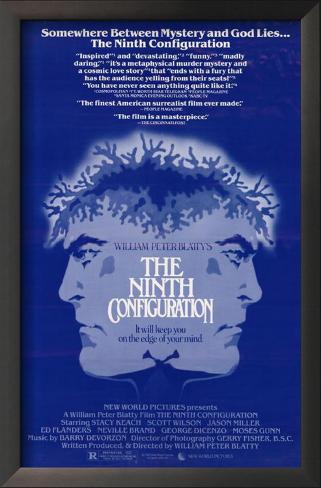Towards the end of the Vietnam War, men with little or no history of mental illnesses or psychosis suddenly have mental breakdowns. Arousing suspicion from the US Military, they decide to house them in "Centre 18", a gothic castle converted into a psychiatric hospital. A brilliant, unorthodox psychiatrist, Colonel Vincent Kane (Stacey Keach), arrives to find the men running rampant and disobeying the orders from Major Marvin Groper (Neville Brand), who has been given the thankless task of caring for these men.
With the assistance of Medical Officer Colonel Fell (Ed Flanders), Colonel Kane's unorthodox methods to let the disturbed men play out their every mad raving, with no control or restraint, will eventually lead to him diagnosing whether they are mentally stable or not. However, if they are not, then he hopes that this "blowing off steam" of theirs will lead to their cure. During this time he allows Lt. Frankie Reno (Jason Miller) to put on an all dog production of Hamlet, allows Major Nammack (Moses Gunn) to wear a Superman costume and allows the men to stage a mock breakout similar toThe Great Escape; with the entire hospital staff all dressed as members of The Gestapo.
With the first half of the film being farcical and comedic in tone, and the last half becoming more of a psychological melodrama, dealing with themes of religion, psychosis, human suffering and the importance of faith, the tone never comes across as overbearing or preachy. To begin with the disturbed military men seem to be fairly obviously false. They attend roll call in a circle, rather than in a straight line and shout out lines from movies rather than calling out their names. However, when the men are left to their own devices, they seem genuinely disturbed. What, for example, could turn astronaut Captain Billy Cutshaw (Scott Wilson), who aborted a mission to the Moon moments before takeoff, from a Harpo Marx prankster to an aggressive man questioning the existence of God?
It is this debate which drives the last half of the film. As Colonel Kane opens himself to Captain Cutshaw, they find themselves discussing faith. Cutshaw explains that he aborted his mission because there is nothing other than what we can see and perceive, and that God cannot exist if pain and misery also exists. Kane, a religious church going man argues that God's existence can be seen in everything beautiful in the world and in examples of human self-sacrifice. Eventually Cutshaw asks for a real life example from Kane, which Kane cannot give.
This is not only an example of the characters' beliefs on faith playing out, but Blatty's. As the second part in his "trilogy of faith" (bookended by The Exorcist in 1973 and The Exorcist III: Legion 1990), Blatty's own faith has been at the forefront of his work as a novelist and as a filmmaker for his entire career. His script is blisteringly witty and scabrously satirical, delving into matters of the soul and the mind.
Cutshaw begins to believe that Kane himself is the one who deserves to be a patient at the hospital, and the longer we see him slowly unraveling, the more we believe this could be true. Stacey Keach plays Colonel Kane as almost catatonically calm, never batting an eyelid to all the craziness he allows the patients to indulge in. However, moments of rage give way to something darker lurking somewhere beneath the surface. On the other hand, Captain Cutshaw, despite his numerous psychologically invoked outbursts, comes across as the one who is the most sane. The darkness in Kane's soul finally bursts out when a new patient arrives who Kane recognises. This leads to secrets being revealed that were long stored away and Kane's bubbling rage bursts out as explosive, unrestrained violence.
While the ensemble cast play off each other well, boasting talented character actors like Robert Loggia, Moses Gunn and Ed Flanders, it is Keach and Wilson who are the strongest. Their performances are nothing short of masterful and rank amongst some of the most underrated of the decade. Blatty's writing and direction is fantastic, balancing humour and pathos with an unrivalled knowledge of religion and psychology, especially in terms of post-traumatic stress disorder. Gerry Fisher's photography is also effective, shooting the castle in a smoky, low angled fashion invoking the memories of classic gothic literature. A film to seek out and treasure.
9/10




No comments:
Post a Comment